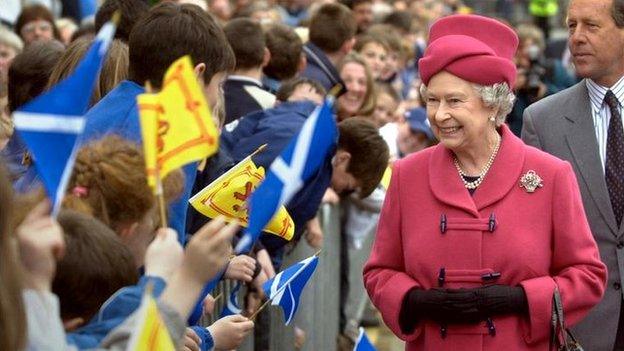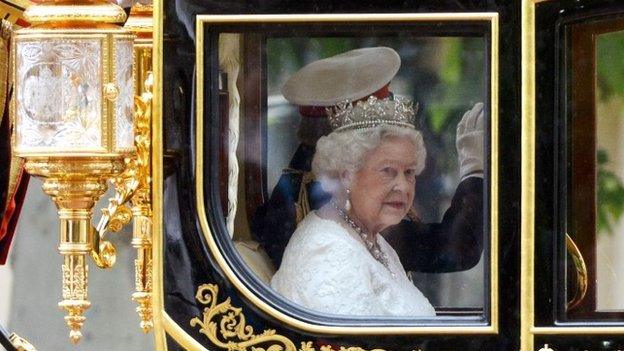What to make of the Queen's referendum remarks?
- Published

Walter Bagehot divided the constitution into the parts which are dignified and the parts which are efficient: that is, the elements designed to impress the lieges and those calculated to run the country.
As has become customary, the Queen's Speech comprised both. As ever, the concatenation provokes a range of responses.
There was Her Majesty, ermined, enthroned, bejewelled, crowned, surrounded by Lords Temporal and Spiritual. They listened, as did the invited MPs, to a Gracious Speech which - among other matters - dealt with plastic bags, mortgage rates and pub tenancies.
From the throne, we heard talk of capping benefits. Some find that contrast gross. Others find it quirkily encouraging, a reminder that this is not the Queen's speech at all, but the policies of her government. A reminder, in short, of the firm limits placed upon the Monarch's power.
That reminder can lead to some slightly uncomfortable consequences. Previously, Her Majesty opened with events in which she had played a part, such as Commonwealth visits. Now, she is obliged to begin with generic propaganda on behalf of her present Ministers, to restate for example their "long term plan to build a stronger economy."

The Queen has made a number of comments on Scotland's place in the UK in the past
You might call that the undignified element of the constitution, as presently operated. And, to be clear, this happened with the previous lot too.
The efficient bit lists the Bills which will be pursued in the final session before the next UK election. Many of them apply, in full or in part, to Scotland. That, says the Scottish Secretary, shows the continuing relevance of Westminster. Which is disputed.
Perhaps the most salient element dealt with the referendum. Her Majesty noted that her government would proceed with plans to enhance the financial powers of the Scottish Parliament and would continue to "make the case for Scotland to remain a part of the United Kingdom."
Those with longer memories will recall that Her Majesty has made a number of comments anent the constitution and Scotland's place in it.
In 1977, on the occasion of her Silver Jubilee, she informed both Houses of Parliament: "I cannot forget that I was crowned Queen of the United Kingdom of Great Britain and Northern Ireland."
At the time, that was widely and rightly interpreted as a Royal rebuff to the then proposals for devolution to Scotland which foundered in 1979.
In 2002, addressing the Scottish Parliament in Aberdeen, Her Majesty warmly praised the relatively new devolved settlement, noting that MSPs were helping, with their work, to "strengthen the bonds that link the nations and regions of the United Kingdom, the Commonwealth and Europe."
At the time, that was widely and rightly interpreted as a move away from her 1977 position, while still firmly positing devolved Scotland within a wider ambit.

So what to make of today's remarks? I think we must see them in the context of this particular occasion. The comments in 1977 and 2002 formed part of Royal speeches, of pronouncements from the Palace.
Today's speech, as discussed earlier, is the verdict of the UK Government which is responsible for content. It is the UK government restating support for the Union, as amended by new Holyrood powers already in the pipeline. At the same time, the Scottish government will continue to make the case for independence - with Her Majesty as Head of State.
Glancing now at the response from rivals to the coalition parties. Labour tries a broad brush approach, condemning "an SNP Scottish Government that is so obsessed with the referendum that they aren't doing anything else, and a Tory-led UK Government that has run out of ideas."
According to Margaret Curran, the answer is for people in Scotland to vote No in September and to "elect a Labour government" next year. A pedant might note that the first decision lies solely within Scotland while the second requires a verdict across the UK more generally.
The SNP complains that there is no mention in the Gracious Speech of future plans for enhancing devolved power; the ideas advanced by the Tories this week and by others at an earlier stage.
Our resident pedant, as deployed above, might note that this is because the speech, by definition, only covers the period up to the election, within the ambit of the current administration.
With regard to the referendum, we might note further that there is an element of the constitution beyond both the dignified and the efficient. That is the democratic. Your referendum, your choice.